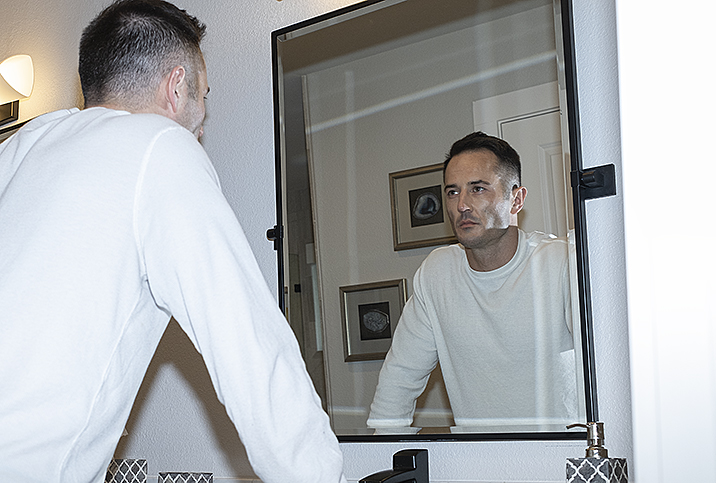We Have Questions: ED Diagnosis

Before erectile dysfunction (ED) sufferers see their primary care doctor or a urologist about their problem, they may feel the need to attempt an at-home ED test. Whether it's due to embarrassment, shame or a can-do attitude, guys often try to self-diagnose before they ever talk to a medical professional.
A few methods to self-test for ED at home are available—though none are particularly popular among urologists—including a stamp test, a penile plethysmograph (a device used to measure blood flow to the penis) and a blood test.
The stamp test involves placing an intact roll of stamps around the flaccid penis to see if an overnight erection breaks through the stamps. The assumption is that while men normally have erections during sleep, a man with ED won't and the stamps will remain connected.
The penile plethysmograph can be used to measure a man's erection as he views porn or other arousing sexual material. A blood test checks for issues such as low testosterone and diabetes, which could potentially lead to ED.
However, before anyone rushes out to buy costly devices, blood tests or extra rolls of stamps, you should know many urologists do not believe these tests are worth it. The stamp test, for one, is antiquated and often inaccurate. Urologists do not typically conduct testing in the office for men who report having ED. It's a condition that calls for a clinical diagnosis, which means it's determined by a doctor taking a detailed medical history and performing a physical exam.
ED tests have largely fallen out of favor because they do not change how it is managed. Its cause is often an underlying medical condition such as diabetes, heart disease, hypertension, obesity, depression and anxiety. Those conditions must be addressed to improve a man's overall health, but some are chronic and will continue to affect erectile function.
Men who suffer from any one or a variety of these conditions may be restricted in what sort of ED treatment they can use. Or they simply may not like the side effects of common treatments. Eddie® is a safe treatment that does not have the side effects of prescription pills, nor does it require a prescription to obtain.
An FDA-registered Class II medical device, Eddie is designed to treat erectile dysfunction and improve male sexual performance—without the need for injections or invasive surgery. And in 2021 clinical trials, 95 percent of men who used Eddie reported a positive effect on their sex life.
Curious men will always want a better understanding of their erectile function, or lack thereof. Since we had questions, we spoke with Seth Cohen, M.D., an assistant professor of urology and the director of sexual medicine at NYU (New York University) Langone Health in New York City.
Is one ED test more common than the others?
The old-school one that's had the most data is the nocturnal penile tumescence (NPT) test. That's been around for a long time. It's pretty cumbersome to do. It takes a while, and it's an expensive piece of machinery. Most doctors no longer want to part with that machinery, so nobody gives it to people to go home with, unless someone wants to buy the machinery and do it at home.
Really, all it is is a blood pressure cuff for your penis. It measures the pressure that your penis generates overnight while you're having nocturnal erections. That's an antiquated test, but it still works. It's a valid test if you're trying to measure nocturnal erections.
Since a detailed medical history is a part of diagnosing ED, what kind of questions do you ask patients?
We use questionnaires like the International Index of Erectile Function (IIEF). Those are very helpful questions. Those are basically the ones I ask. I ask about the frequency of the issue. How often are you able to have an erection? Is it hard enough to penetrate? When did it start? Are you able to have sex more often than not? Are you failing more often than not? Do you have morning erections? When you masturbate, are the erections hard or are they also not firm during masturbation?
How much do you rely on self-tests?
I think it's usually pretty obvious for the patient. If he's striking out more times than not and there's no other etiology or issue, then I don't think this is somebody who needs to be testing at home. He just needs to come in and see a urologist.
What are you looking for with each test you run?
[The ED testing] is going to be predominantly clinical, and if there's any question as to what's going on, then we can use something called a penile duplex Doppler ultrasound (PDDU). That's basically a fancy ultrasound test [with the penis] in the erect state, and you measure the blood flow going in and out of the penis.
What is the newest test?
It's sort of like coming up with an at-home test to tell someone they're having a headache. It's like, "Yeah, I have a headache. I know I have a headache. I want treatment for it." It's the same thing with erectile problems. "I know my erections aren't working. I don't need an at-home test to tell me that." In terms of an at-home NPT or an at-home penile doppler, that wouldn't be feasible; those are highly complicated procedures that are only done in a doctor's office.


















